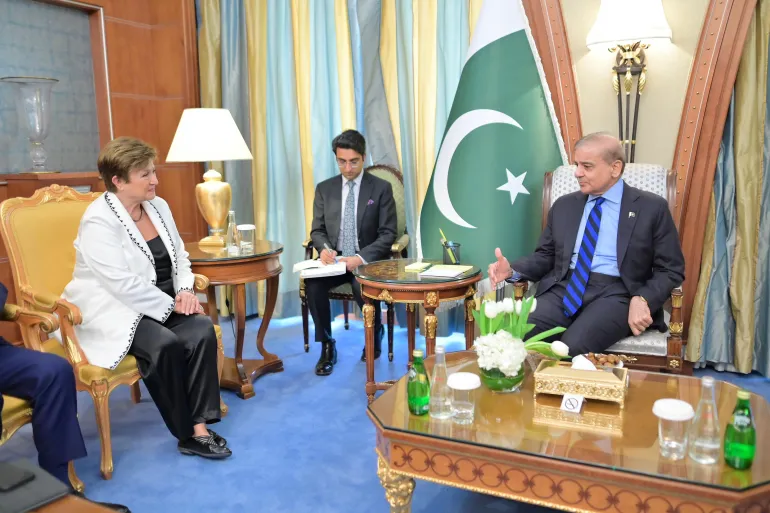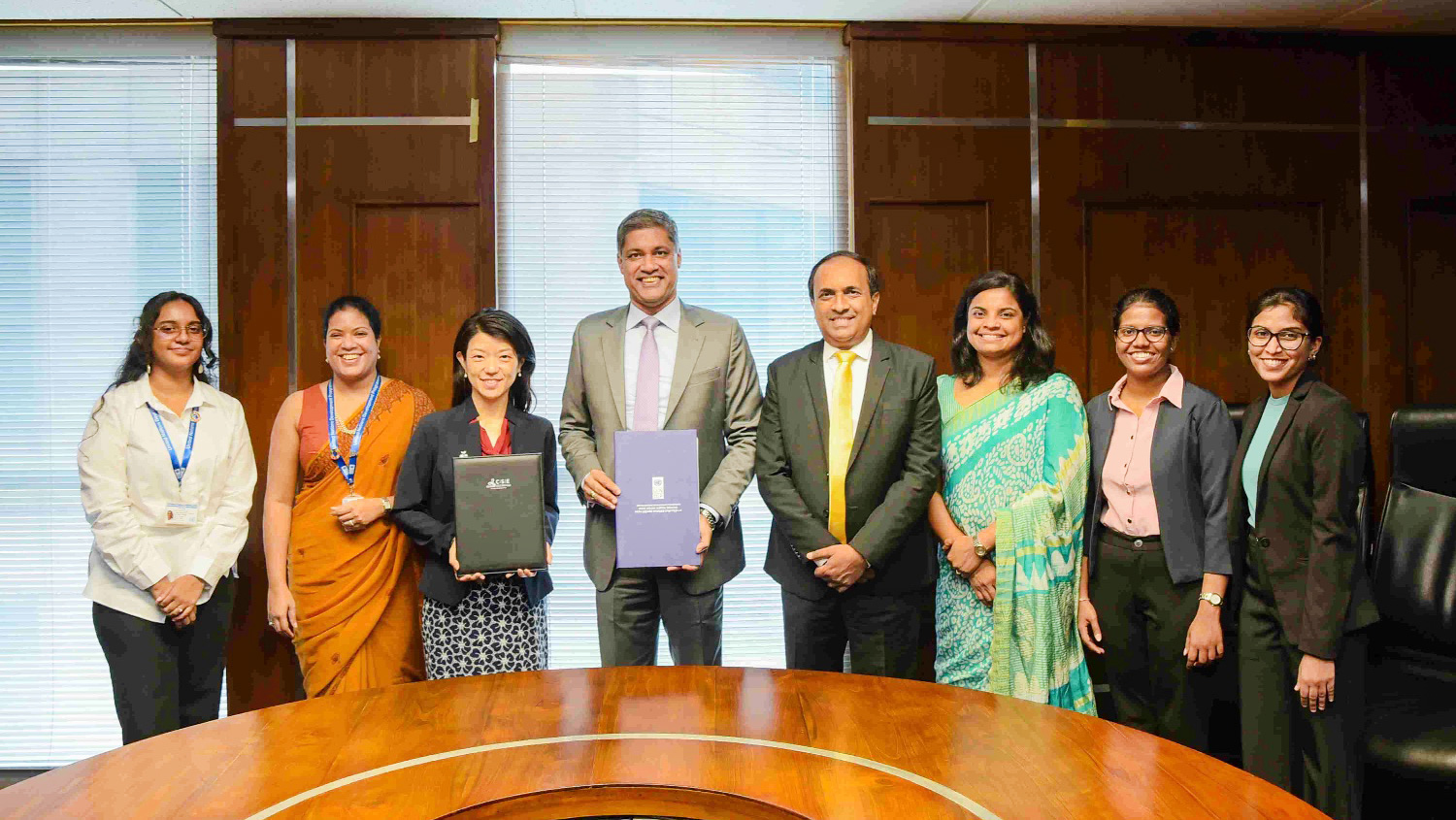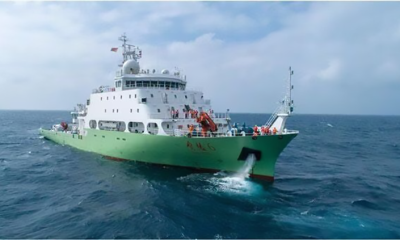Business
HNB and Ideal Motors partner up once again to offer exclusive perks on Mahindra automobiles, Powerol generators

Sri Lanka’s leading private sector bank, HNB PLC, has entered into a fresh agreement with Ideal Motors (Pvt.) Ltd, to promote and offer financing solutions for Mahindra automobiles and generators.
A Memorandum of Understanding (MoU) was signed at Ideal Motors Head Office, which saw the participation of HNB Assistant General Manager (AGM) – Personal Financial Solutions, Kanchana Karunagama and Ideal Motors Director – Automotive, Chaminda Wanigarathna, among other representatives from both companies.
Business
IMF promises Pakistan ‘immediate’ release of $1.1bn loan after key meet

Cash-strapped Pakistan is poised to receive a $1.1bn loan tranche from the International Monetary Fund (IMF) after a key meeting of the international lender’s executive board on Monday, even as economists have warned that the country needs deep reforms to reduce its dependence on overseas financial assistance.
Late on Monday night, Pakistan’s Ministry of Finance and the IMF confirmed that the lender had approved the ‘immediate disbursement’ of a $1.1bn tranche that completes a total loan of $3bn agreed to under a deal inked last year.
But the approval came with firm words from the IMF. “To move Pakistan from stabilization to a strong and sustainable recovery the authorities need to continue their policy and reform efforts, including strict adherence to fiscal targets while protecting the vulnerable; a market-determined exchange rate to absorb external shocks; and broadening of structural reforms to support stronger and more inclusive growth,” the organisation said in a statement.
The bailout followed a meeting between Pakistani Prime Minister Shehbaz Sharif and IMF Managing Director Kristalina Georgieva, on the sidelines of the World Economic Forum meeting in Riyadh on Sunday.
Sharif’s government had sought a new IMF deal after the current $3bn standby arrangements (SBA) with the global lender expired on April 11.
Hours after the IMF approved the funding, Sharif on Tuesday said disbursement will bring increased economic stability to Pakistan. The bailout from the IMF proved important to save the country from default, the country’s state broadcaster quoted the prime minister as saying.
Pakistan has been reeling from a severe economic crisis for more than two years, with its inflation at one point shooting up to nearly 38 percent and its foreign currency reserves depleted to $3bn in February 2023, enough to cover less than five weeks of imports.
In June last year, Sharif was able to avoid a sovereign default when he secured the IMF bailout, pushing the current forex reserves to almost $8bn, according to the latest central bank data.
Khaqan Najeeb, a former adviser to the Finance Ministry, told Al Jazeera the performance of Pakistan’s $350bn economy in the past nine months has shown that the country’s meagre foreign reserves have increased and that inflation which was at 20 percent in March, has reduced, though slowly.
“Broadly, we can define Pakistan’s economic situation as macro-stabilisation, which is a consequent effect of adjustment policies, but it also means that growth is expected to remain slow and hover around 2 percent,” he said.
Leading Pakistani economist Kaiser Bengali, however, had reservations about the economic outlook as he questioned the sustainability of the current policies, wanting to see more structural reforms.
Bengali called the current economic indicators a “mirage”, adding that the perceived stability was due to the prospect of more loans coming in.
“If the so-called stability was due to a rise in exports or better inflow of dollars, that would have been meaningful but that is not happening. What we are seeing right now is a temporary situation, where the market is responding to day-to-day information,” he told Al Jazeera.
“The economy cannot run on merely an inflow of loans. How will we repay all our [existing] loans?”
Pakistan’s external debt obligations currently stand at more than $130bn, with Lahore-based economist Hina Shaikh fearing the current policy of using more debt to address fiscal deficit will create more inflation.
“Without a commitment to initiate reforms that rationalise expenditures and expand the tax net to increase tax revenues, the macroeconomic situation will not change much. Unless more goods are produced and there is real growth – that is exports see a boost, manufacturing takes place, there are productive employment opportunities – inflation will remain on the rise,” she told Al Jazeera.
Bengali said recent Pakistani governments had a single-point agenda of figuring out “where to get new loans to pay the past loans”.
“Public sector development has been left behind. In the last four decades, there has barely been any major project for health, education or housing,” he said.
Najeeb, the former government adviser, said the main challenge for the country in the coming days was to put together a framework that could result in growth “based on productivity and investment”.
“We must remember that Pakistan already owes them [IMF] $7bn,” he added.
Bengali signed off with a warning: Even the IMF could be reluctant to put in large sums of money to help Pakistan come out of its financial crisis.
“No bank will give you loans indefinitely, especially when they see a deteriorating balance sheet,” he said.
(Aljazeera)
Business
Pan Asia Bank posts steady performance in 1Q 2024 – Profit before Tax increases by 47% reflecting improved conditions

Pan Asia Banking Corporation PLC reported a steady performance reflecting improved macro-economic conditions as the Bank reported its financial performance during 1Q 2024, which showed judicious portfolio management and prudency exercised in dealing with possible fallout on its asset quality in challenging times. The Bank reported a Pre-tax Profit of Rs. 796 Mn for the quarter ended 31st March 2024, which is 47% increase compared to the corresponding quarter last year, supported by improved net interest income, net fee & commission income, and other operating income.
The Sri Lankan economy has experienced some positive signs of gradual economic recovery and a measure of stability in macro-economic factors compared to the corresponding quarter last year, with the appreciation of LKR against USD and the IMF bailout followed by the Domestic Debt Optimization (DDO) announcement.
The models used regarding collective impairment in 2023 were continued in 1Q 2024 to ensure that adequate provision buffers were in place to absorb any potential credit risk that could arise in the future. The allowance for overlays applied in 2023 were continued and maintained during 1Q 2024 as well. Meanwhile, the Bank managed to end the quarter with healthy credit quality matrices due to improved credit underwriting standards and concerted collection & recovery efforts. The Bank also increased impairment provision buffers held on Stage 1 and 2 exposures further during 1Q 2024 to accommodate elevation in credit risks of affected borrowers/segments.
Since the latter part of 2023, market interest rates for both lending and deposit interest rates have gradually come down in line with the policy decisions of the by the Monetary Board of CBSL to reduce policy rates couple of times.
The Bank’s net fee and commission income has increased by 17% during 1Q 2024 mainly due to the increase in fee income generated from loans and advances due to increased demand for credit which resulted from the prevailing low interest rate regime and other conducive macro-economic factors in the country.
The other operating income has increased significantly by 293% due to the prudently managed FX Positions with the appreciation of LKR against USD from Rs. 324 to Rs. 300 during 1Q 2024.
The increase in personnel expenses is mainly driven by increased staff salaries, bonuses, and allowances. The increase in other operating expenses contained to 8% due to the effective cost management strategies of the Bank and the cost increase is primarily due to effect of increase of VAT rates from 01st January 2024 onwards and general price increase of goods and services such as electricity and travelling expenses.
(Pan Asia Bank)
Business
Signing of MoU between UNDP and Colombo Stock Exchange

The United Nations Development Programme (UNDP) in Sri Lanka and the Colombo Stock Exchange (CSE) signed a Memorandum of Understanding (MoU) to establish a partnership aimed at leveraging Sri Lanka’s capital markets for sustainable financing. This collaboration is intended to support and encourage private sector stewardship and embed sustainability as an important element of business strategy in Sri Lanka. Specifically, the collaboration intends to actively support and engage the private sector, especially in integrating SDGs into their business systems and practices, while also ensuring that business decisions lead to net positive impacts on the SDGs and that such contributions can be measured and validated.
To this end, Dilshan Wirasekara, Chairman, Colombo Stock Exchange and Ms. Azusa Kubota, Resident Representative, UNDP in Sri Lanka signed the MoU. Rajeeva Bandaranaike, CEO CSE, Ms. Punyamali Saparamadu, Senior Vice President – Commercial, Ms. Yasuri Tennakoon, Junior Analyst – Commercial and Ms. Devni Galabada, Junior Legal Officer – Legal and Enforcement; Ms. Dulani Sirisena, Policy Specialist and Team Leader, Sustainable Growth Team, UNDP in Sri Lanka, and Ms. Hakshala David, Economist-Innovative Financing Associate, Sustainable Growth Team, UNDP in Sri Lanka were also in attendance for the occasion.
-

 Business6 days ago
Business6 days agoTelin and Dialog Axiata ink strategic partnership to manage international voice and SMS termination
-

 Business3 days ago
Business3 days agoSri Lanka Resorts of Cinnamon Hotels & Resorts mark Earth Day with impactful eco-initiatives
-

 Business5 days ago
Business5 days agoComBank crowned ‘Best Bank in Sri Lanka’ by Global Finance for 22nd year
-

 Business4 days ago
Business4 days agoUNESCAP Technical Cooperation Highlights Report flags significant strides in its partnership with Sri Lanka
-

 Business4 days ago
Business4 days agoDialog Axiata recognised as the Most Significant FDI Contributor by BOI
-

 Business5 days ago
Business5 days agoCinnamon Lakeside Colombo welcomes Nazoomi Azhar as its new General Manager
-

 News2 days ago
News2 days agoSri Lankan Oil and Gas exploration grinds to a standstill amid protracted legal battle
-

 News2 days ago
News2 days agoGerman research ship allowed Sri Lanka port call after Chinese-protest led clarification







































